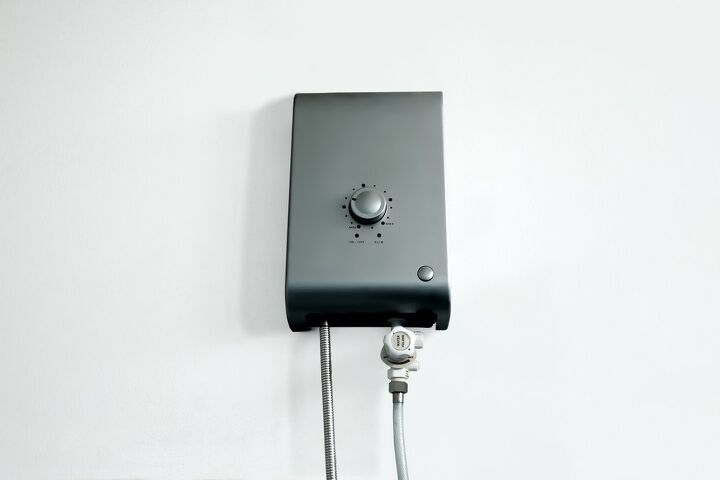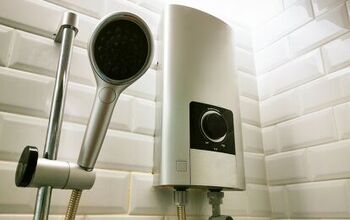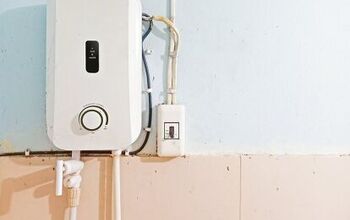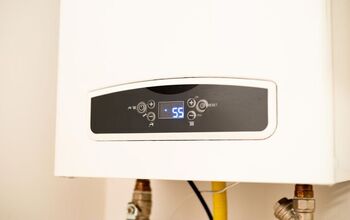Condensing Vs. Non-Condensing Tankless Water Heaters

If you’re getting rid of your 50-gallon old-fashioned water heater and choosing to go with a tankless heater instead, congratulations! You’ll be saving a lot of space.
But there are two kinds of tankless water heaters out there, and you should know the ins and outs of both before you purchase one over the other. This article will explain what condensing and non-condensing water heaters are, while also focusing on which system is the better of the two.
Condensing and non-condensing tankless water heaters are both reliable and cost-effective, but the condensing system provides more utility than the non-condensing system. Also, because it utilizes heat-recycling technology, it’s more energy-saving too. Both tankless water heaters are better than traditional water heaters, and many would assert that tankless systems are better than electrical ones too.
Do You Need Tankless Water Heater Installation?
Get free, zero-commitment quotes from pro contractors near you.

What Is a Tankless Water Heater?
Tankless water heaters, as their name indicates, do not store water in tanks like traditional water heaters. Instead, a heat exchanger is used to heat cold water on demand, making water storage unnecessary. The water is heated via combustion, and stainless steel pipes help maintain the water’s temperature as it flows from the heater to the taps.
Tankless water heaters have largely replaced traditional water heaters, mainly because tankless heaters are more efficient and cost-effective than their predecessors.
There are two kinds of tankless water heaters, and while both are better than a traditional water heater, one must know which of the two heaters is ideal for their home.
What Is a Condensing Tankless Water Heater?
A condensing tankless water heater is what’s known as a closed system, meaning it only vents vapor when the vapor is no longer useful for heating. In other words, a condensing tankless water heater recycles the heat it produces. Once it can no longer do this, the heat is released.
If you install a condensing water heater, you won’t have to install an elaborate ventilation system to go along with it, and this is because the steam passing through the ventilation system will not be that hot. Even standard PVC pipe can be used, as this will stand strong in the face of hot and corrosive steam.
Unlike non-condensing systems, which only have one heat exchanger, a condensing system has two. Exhaust loops back through the system before it’s released, a recycling process that non-condensing heaters aren’t capable of performing.
The vapor which comes out of a condensing heater is cooler because it’s cooled inside the machine. Condensation is also collected in a condensing water heater, and once there’s too much it’s drained.
What Is a Non-Condensing Tankless Water Heater?
Most gas-powered tankless water heaters are non-condensing water heaters, and these heaters are ideal for homeowners who are making the switch from a traditional water heater to a tankless system. This is mainly because a non-condensing tankless water heater can be connected to a pre-existing ventilation system.
Unlike the condensing tankless water heater discussed above, a non-condensing water heater does not recycle the steam it produces, which means this steam—which is extremely hot and corrosive—has to be vented through a special ventilation system that can handle it.
Some say the non-condensing tankless water heater is the most basic version of tankless water heater, as it’s only equipped with one heat exchanger. And unlike a condensing system that releases cooler steam, a non-condensing system can release steam that’s in excess of 300°F.
If one can ensure their ventilation is up to the task of handling a non-condensing tankless water heater, they will surely enjoy this reliable system. Non-condensing tankless water heaters have made old-fashioned water heaters obsolete.
Condensing vs. Non-Condensing Tankless Water Heaters
Condensing tankless water heaters and non-condensing tankless water heaters are both reliable, but one may be better than the other for your home or business. In the following sections, condensing and non-condensing water heaters are going to be compared according to price, longevity, efficiency, and saving.
You should take all the pros and cons discussed below in totality before you purchase a condensing or non-condensing tankless water heater.
Price
Condensing tankless water heaters are more expensive than their non-condensing counterparts, mainly because condensing heaters utilize more than one heat exchanger.
In general, a condensing system utilizes more components than a non-condensing system, which means maintenance will be required more. Also, maintenance will cost more for a condensing system.
In the end, a condensing tankless water heater will save you money in the long run—it’s just a question of how much you want to pay upfront. Non-condensing heaters are cheaper than condensing ones, but these latter heaters are more efficient and easier to operate than water heaters which require special ventilation.
Longevity
If they’re taken care of properly, both condensing and non-condensing water heaters can last longer than 20 years. But one must remember that both systems employ a lot of components, and at any point, one of these components could wear out and render the system inoperable.
Take condensing tankless water heaters, for example. Sure their pipes are capable of handling extremely hot and corrosive steam, but even these degrade over time. Eventually, replacement will be necessary.
Non-condensing water heaters, on the other hand, require an exhaust ventilation system, and over time this can degrade and lead to leaks.
In short, longevity comes down to a question of maintenance. If you take good care of your system, you won’t have to spend a lot on maintenance and repair. Furthermore, replacement will only be considered a long way down the road.
Efficiency
Both condensing and non-condensing tankless water heaters are incredibly efficient, mainly because they’re both gas-powered. Of course, these heaters outperform traditional water heaters, but electric water heaters also pale in comparison when measured against either condensing or non-condensing water heaters.
In the end, however, condensing water heaters will outperform non-condensing heaters 90% of the time, and this is because they have a heat-recycling function that allows them to run longer than their non-condensing counterparts.
Saving
If you want to use—and pay for—as little energy as possible, you should consider purchasing a condensing tankless water heater. Because this tankless water heater recycles the extra heat it produces, it’s much more energy-efficient than a non-condensing model.
Also, if the system utilizes condensation properly, it can recycle this, lessening the demand for new water. In short, a condensing tankless water heater will reduce your energy and water bills while also ensuring you have hot water on demand.
Condensing and non-condensing water heaters are both space-saving, especially when compared to clunky traditional water heaters. They’re both similar in size to most electrical heaters, so there’s no real space-saving difference here.
If you can’t get enough free space at home, you should choose either a condensing water heater or a non-condensing water heater. Either system is good, but the condensing tankless system commands a slight edge.
Related Questions
Since tankless water heaters are becoming more common, it’s no surprise that a growing number of homeowners have questions about these systems. Below, some of the frequently asked questions are answered. Read through these so you know more about condensing and non-condensing tankless water heaters.
Are tankless water heaters good for the environment?One downside of tankless water heaters is that they release toxic vapor into the air, so they’re not that great for the environment. All gas-powered heaters have some kind of carbon footprint, but one can take comfort in knowing that a condensing heater is better for the earth than its peers.
If you want something that is eco-friendly, consider an electric water heater. These are reliable, but they don’t possess the power gas heaters do.
Does one ever have to worry about their water not being hot?Unless your system is broken, you don’t have to worry about it not supplying hot water when you need it. Just because a tankless water heater doesn’t have a reserve of hot water on deck doesn’t mean it can’t produce hot water quickly.
Since tankless systems deliver hot water on demand, less energy is spent heating water (which one may never use).
How does a condensing tankless water heater get rid of condensation?Once condensation is inside the unit, it has to be neutralized before it can be drained. A tankless water heater utilizes a filtration or dilution system to accomplish this. Once the condensation has been neutralized, it can be drained through a special pipe and taken outside the home.
Do You Need Tankless Water Heater Installation?
Get free, zero-commitment quotes from pro contractors near you.

Final Note
In the end, both condensing and non-condensing tankless water heaters are ideal for homeowners and many business owners, but a condensing heater has a slight edge over the non-condensing one. This is because a condensing tankless water heater can recycle its excess heat, making it more efficient and cost-effective.
Installing this device does require more money upfront, but in the long run, a condensing tankless water heater will provide more utility for a longer period of time than a non-condensing one.

Matt loves everything DIY. He has been learning and practicing different trades since he was a kid, and he's often the first one called when a friend or family member needs a helping hand at home. Matt loves to work with wood and stone, and landscaping is by far his most favorite pastime.
More by Matthew Mountain



























